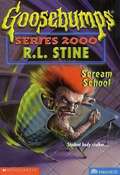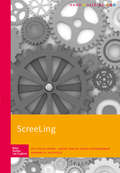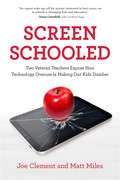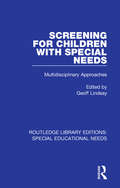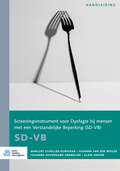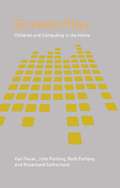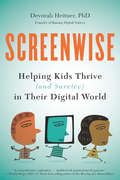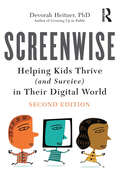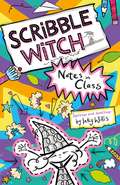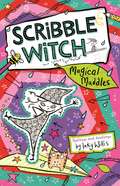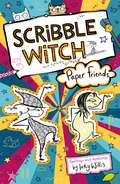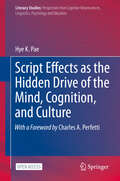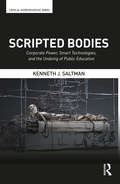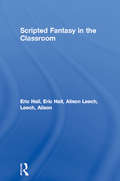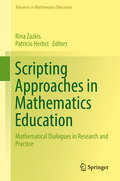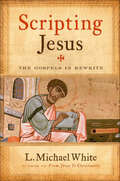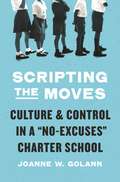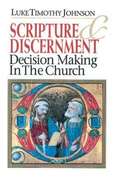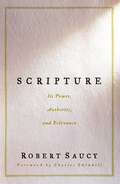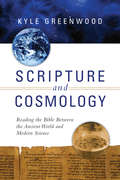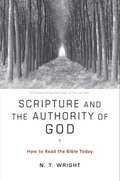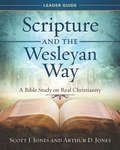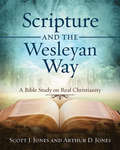- Table View
- List View
Scream School (Goosebumps Series 2000 #15)
by R. L. StineJake's dad makes scary flicks like Scream School 1, 2 and 3, all starring Johnny Scream. The creepy star is just an action figure who lives on the big screen ... until Mr. Field begins filming Scream 4.
ScreeLing: handleiding
by Evy Visch-Brink M. van de Sandt-Koenderman Hanane HachiouiDoel van de testMet de ScreeLing is screent men in korte tijd op afatische stoornissen op de linguïstische niveaus semantiek (woordbetekenis), fonologie (klankherkenning) en syntaxis (zinsstructuur). Het unieke van de ScreeLing is dat deze taalverwerkingsniveaus in één test verenigd zijn. Nog belangrijker is dat de ScreeLing al in de eerste week na een beroerte of een hersentrauma kan worden afgenomen. Door in een vroeg stadium de ScreeLing af te nemen, kan snel met gerichte therapie (bijvoorbeeld cognitief-linguïstische therapie) worden gestart. Zo wordt ingespeeld op het natuurlijke herstel van de neurale circuits die verantwoordelijk zijn voor de semantische, fonologische en/of syntactische taalverwerking. Het resultaat van de therapie verbetert daarmee. Daarnaast helpt vroegtijdig inzicht in het linguïstische patroon van de afatische stoornis patiënten en hun familie om beter om te gaan met moeilijke communicatieve situaties. In de eerste drie maanden na het ontstaan van het hersenletsel kan de ScreeLing worden gebruikt om herstelpatronen vast te stellen, al dan niet in samenhang met gegeven therapie. Ook in het chronische stadium van de afasie kan de Screeling worden ingezet om snel een globaal beeld te krijgen van de aangetaste linguïstische niveaus.Toepassing• Screening: stelt stoornissen vast in de linguïstische niveaus semantiek, fonologie en syntaxis• Diagnostiek: geeft een eerste indicatie van de afatische stoornis, waarna de afasie uitgebreider kan worden onderzocht.• Behandeling: geeft een indicatie voor de te kiezen therapie• Evaluatie: brengt herstelpatronen in kaart en het effect van therapie.Wat meet de ScreeLing?De ScreeLing meet het functioneren van afatici op het gebied van de semantiek, fonologie en syntaxis. Voor een zo specifiek mogelijke diagnostiek zijn deze hoofdschalen steeds onderverdeeld in 4 subschalen (diagnostische taken) die de essentie weergeven van de taalverwerking op de drie gebieden.• Semantiek: 1. matchen woord/afbeelding 2. beoordeling semantisch goede en foute zinnen 3. woordassociatie 4. categoriseren (‘odd word out’)• Fonologie: 1. nazeggen 2. hardop lezen 3. foneemgelijkenis 4. foneemanalyse• Syntaxis: 1. matchen woord of zin met afbeelding 2. wie/wat/waar-vragen 3. beoordeling syntactisch goede en foute zinnen 4. invullen functiewoordenVoor wie?De ScreeLing wordt afgenomen door logopedisten en klinisch linguïsten. De test kan ook worden afgenomen door andere professionals met affiniteit voor afasie en taal, zoals neuropsychologen, klinisch psychologen of neurologen. Afname en scoringDe afnametijd van de ScreeLing is gemiddeld 30 minuten. In totaal bevat de ScreeLing 72 items. De test is aan het bed afneembaar.Belangrijk: u kunt deze test alleen afnemen indien u over de Screeling complete set beschikt. NormenVoor de interpretatie worden cut off-scores gehanteerd. Deze geven aan of zich in de linguïstische niveaus stoornissen voordoen en in welke mate. Materiaal• ScreeLing- complete set • ScreeLing- scoreformulieren (set van 25)• ScreeLing -handleiding
Screen Schooled: Two Veteran Teachers Expose How Technology Overuse Is Making Our Kids Dumber
by Joe Clement Matt MilesOver the past decade, educational instruction has become increasingly digitized as districts rush to dole out laptops and iPads to every student. Yet the most important question, "Is this what is best for students?" is glossed over. Veteran teachers Joe Clement and Matt Miles have seen firsthand how damaging technology overuse and misuse has been to our kids. On a mission to educate and empower parents, they show how screen saturation at home and school has created a wide range of cognitive and social deficits in our young people. They lift the veil on what's really going on in schools: teachers who are often powerless to curb cell phone distractions; zoned-out kids who act helpless and are unfocused, unprepared, and unsocial; administrators who are influenced by questionable science sponsored by corporate technology purveyors. They provide action steps parents can take to demand change and make a compelling case for simpler, smarter, more effective forms of teaching and learning.
Screening for Children with Special Needs: Multidisciplinary Approaches (Routledge Library Editions: Special Educational Needs #36)
by Geoff LindsayFirst published in 1984. Screening and prevention are key issues in health, education and welfare, yet they are also extremely vague. Many professionals are unaware of what can be done and who should do it, particularly in the important area of screening young children for special educational or medical provision. This book considers the problem from the standpoint of a whole range of professionals involved in education, health or social provision. Each chapter focuses on a number of points: problems faced by the professional in question; the sort of job screening procedures that exist or are possible; the sort of tests and assessments that are used; referral; and the sort of intervention procedures that are possible. Case study material is included throughout and the book concludes with a review of the problems of collaboration and of establishing an effective screening system. The book should thus be of immediate interest to students and professionals in a wide range of work that involves children.
Screeningsinstrument voor Dysfagie bij mensen met een Verstandelijke beperking (SD-VB): Handleiding
by Marloes Schüller-Korevaar Susanna van der Woude Johanna Hovenkamp-Hermelink Alain DekkerDit screeningsinstrument helpt om een verhoogd risico op voedings- en slikproblemen (dysfagie) op te sporen bij mensen met een verstandelijke beperking. Het maakt daarvoor niet uit wat de oorzaak is van de beperking, of wat het niveau van de cliënten is. Met behulp van het screeningsinstrument voor dysfagie bij mensen met een verstandelijke beperking (SD-VB) wordt ondersignalering van dysfagie bij mensen met een verstandelijke beperking voorkomen. Een verhoogd risico op dysfagie wordt tijdig in kaart gebracht waardoor adequaat diagnostiek en behandelbeleid kan worden ingezet. Dit leidt tot verlaging van risico’s en verbetering van de kwaliteit van leven.Deze handleiding bevat naast de verantwoording van de ontwikkeling en gebruikersinstructies (afname, scoring, interpretatie) ook een beschrijving van het cyclische dysfagiewerkproces waarin het SD-VB idealiter wordt ingezet. Dit proces, beginnend bij het moment van screenen op verhoogd dysfagierisico tot enmet het uitvoeren en evalueren van het logopedisch behandelbeleid, is onmisbaar voor goede dysfagiescreening, -diagnostiek en -behandeling in de praktijk.Het SD-VB bestaat uit 29 ja/nee-vragen over eet- en drinkgedrag. Zorgverleners kunnen dit gemiddeld in vier minuten invullen. Ze hebben hiervoor geen cursus nodig. De interpretatie van de scores is voorbehouden aan logopedisten.Marloes Schüller-Korevaar en Susanna van der Woude zijn beiden logopedist-onderzoeker, Ans Hovenkamp-Hermelink is senior onderzoeker. Zij zijn werkzaam bij de afdeling Praktijkgericht Wetenschappelijk Onderzoek van Alliade, net als Alain Dekker die hoofd van deze afdeling is.
Screenplay: Children and Computing in the Home
by John Furlong Rosamund Sutherland Keri Facer Ruth FurlongWhat are young people really doing on computers at home?Computers feature heavily in the lives of today's young people, and this book sets out to question commonplace assumptions about the use of technology by children at home. Bringing together research from the perspective of psychology, sociology, education and media studies, the authors ask whether we are really witnessing the rise of a new 'digital generation'.Drawing upon the results of their in-depth research project, the authors filter and assess their findings accessibly, offering fascinating reading on:* how computers are used in the home* how parents and children negotiate access to and use of the computer* what role the computer plays in the day to day lives of families.This book makes use of illuminating case studies, and highlights key issues of concern around issues of equality and access in a wider social context. This truly interdisciplinary perspective will be instrumental in reshaping the understanding of teachers, ICT advisors, policy makers and all involved in ICT for children.
Screenwise: Helping Kids Thrive (and Survive) in Their Digital World
by Devorah HeitnerScreenwise offers a realistic and optimistic perspective on how to thoughtfully guide kids in the digital age. Many parents feel that their kids are addicted, detached, or distracted because of their digital devices. Media expert Devorah Heitner, however, believes that technology offers huge potential to our children-if parents help them. Using the foundation of their own values and experiences, parents and educators can learn about the digital world to help set kids up for a lifetime of success in a world fueled by technology. Screenwise is a guide to understanding more about what it is like for children to grow up with technology, and to recognizing the special challenges-and advantages-that contemporary kids and teens experience thanks to this level of connection. In it, Heitner presents practical parenting "hacks": quick ideas that you can implement today that will help you understand and relate to your digital native. The book will empower parents to recognize that the wisdom that they have gained throughout their lives is a relevant and urgently needed supplement to their kid's digital savvy, and help them develop skills for managing the new challenges of parenting. Based on real-life stories from other parents and Heitner's wealth of knowledge on the subject, Screenwise teaches parents what they need to know in order to raise responsible digital citizens.
Screenwise: Helping Kids Thrive (and Survive) in Their Digital World
by Devorah HeitnerThe second edition of Screenwise offers a refreshed, realistic, and optimistic perspective on how to thoughtfully guide kids in the digital age. Many parents feel that their kids are addicted, detached, or distracted because of their digital devices. Media expert Devorah Heitner, however, believes that technology offers huge potential to our children—if parents mentor them. Using the foundation of their own values and experiences, parents and educators can learn about the digital world to help set kids up for a lifetime of success in a world fueled by technology. Screenwise is a guide to understanding more about what it is like for children to grow up with technology all around them, and to recognizing the special challenges—and advantages—that contemporary kids and teens experience thanks to this level of connection. In it, Heitner presents practical parenting "hacks": quick ideas that you can implement today that will help you understand and relate to your digital native. The new edition includes updated material and additional strategies for parents and caretakers.
Scribble Art: Independent Process Art Experiences for Children (Bright Ideas for Learning #3)
by MaryAnn F KohlEnter the world of creativity where children's imaginations soar.Scribble Art is packed full of a broad spectrum of over 240 open-ended process art activities and ideas. Process art allows a child to participate in an individual and unique art experience using common household items and ordinary art supplies. The purpose of process art is to engage children in the process of creation, rather than focus on a finished product. Process art engages children, builds art confidence, and can be used to introduce art topics to all ages.
Scribble Witch: Book 1
by Inky WillisWelcome to the new magical series about a girl and her secret scribble witch, guaranteed to make 7-9s laugh out loud.When Molly's best friend announces that she's moving to a new school, a blue Wednesday becomes the Worst Wednesday Ever. That is until some unexpected magic brightens up Molly's day. Notes, a tiny paper witch who has been lurking in a pen pot, springs to life - and into action! Some of the things Notes does are absolutely NOT helpful and get Molly into trouble with her grouchbag teacher. But it's surprising what one tiny witch, armed with nothing more than a pencil, can achieve before the bell for home time rings... With a vibrant, unique voice, and amazing illustrations to match, Inky Willis conjures up magic for every reader!
Scribble Witch: Book 2 (Scribble Witch Ser.)
by Inky WillisA hilarious double-act like no other! Accidentally naughty nine-year-old Molly and Notes, the secret scribble witch who lives in her pen pot face friendship troubles, spelling championships and, of course, a few magical muddles along the way. When Molly finds out her best friend, Chloe, is moving schools, it feels like the end of the world. That's until she realises her secret paper witch, Notes, can fly letters between them. But then Molly receives a note from Chloe that mentions her new friends and the Inter-School Spelling Championship and her bubble bursts. In retaliation, Molly enters herself into the competition. Just one tiny problem: Molly absolutely HATES spelling.Meanwhile, Notes is up to her usual tricks and is determined to help Molly make new friends of her own. Of course, there are a few magical muddles along the way ... Can Molly and Chloe get their friendship back on track? Will Notes succeed in her mission? And who will win the dreaded Inter-School Spelling Championship? With a vibrant, unique voice, and amazing illustrations to match, Inky Willis conjures up magic for every reader!Have you read the first book in the series, Notes in Class?
Scribble Witch: Book 3
by Inky WillisA hilarious double-act like no other! Accidentally naughty nine-year-old Molly and Notes, the secret scribble witch who lives in her pen pot discover all things ancient Egypt, including a mysterious new friend. Molly often experiences some magic to brighten up her school day - thanks to Notes, the tiny paper witch who lives in her pen pot. Notes loves to help her friends ... though her helping often gets Molly into trouble with her grouchbag teacher! And when Notes decides to go with Molly on their school trip to the local ancient Egypt exhibition, Molly knows Notes is bound to get up to her usual tricks. Will Notes use her magic powers to help Molly sort out her best friends' problems? Who is Notes's secret paper friend? And what ancient treasure is the class going to uncover back at school?With a vibrant, unique voice, and amazing illustrations to match, Inky Willis conjures up magic for every reader!Have you read the first two books in the series, Notes in Class and Magical Muddles?
Script Effects as the Hidden Drive of the Mind, Cognition, and Culture (Literacy Studies #21)
by Hye K. PaeThis open access volume reveals the hidden power of the script we read in and how it shapes and drives our minds, ways of thinking, and cultures. Expanding on the Linguistic Relativity Hypothesis (i.e., the idea that language affects the way we think), this volume proposes the “Script Relativity Hypothesis” (i.e., the idea that the script in which we read affects the way we think) by offering a unique perspective on the effect of script (alphabets, morphosyllabaries, or multi-scripts) on our attention, perception, and problem-solving. Once we become literate, fundamental changes occur in our brain circuitry to accommodate the new demand for resources. The powerful effects of literacy have been demonstrated by research on literate versus illiterate individuals, as well as cross-scriptal transfer, indicating that literate brain networks function differently, depending on the script being read. This book identifies the locus of differences between the Chinese, Japanese, and Koreans, and between the East and the West, as the neural underpinnings of literacy. To support the “Script Relativity Hypothesis”, it reviews a vast corpus of empirical studies, including anthropological accounts of human civilization, social psychology, cognitive psychology, neuropsychology, applied linguistics, second language studies, and cross-cultural communication. It also discusses the impact of reading from screens in the digital age, as well as the impact of bi-script or multi-script use, which is a growing trend around the globe. As a result, our minds, ways of thinking, and cultures are now growing closer together, not farther apart.
Scripted Bodies: Corporate Power, Smart Technologies, and the Undoing of Public Education (Critical Interventions)
by Kenneth J. SaltmanFrom drugging kids into attention and reviving behaviorism to biometric measurements of teaching and learning Scripted Bodies exposes a brave new world of education in the age of repression. Scripted Bodies examines how corporeal control has expanded in education, how it impacts the mind and thinking, and the ways that new technologies are integral to the expansion of control. Scripted Bodies contends that this rise in repression must be understood in relation to the broader economic, political, and cultural forces that have produced an increasingly authoritarian society. This book details how these new forms of corporeal control shut down the possibility of public schools developing as places where thinking becomes the organizing principle needed to contribute to a more equal, just, and democratic society.
Scripted Fantasy in the Classroom
by Eric Hall Alison LeechMany teachers have tried simple relaxation techniques in their classrooms and been surprised by their success. This step by step guide to the technique of scripted fantasy shows how the forces of the imagination can be harnessed to improve the social skills and classroom performance of students of all ages and all abilities. It provides sample scripts to get the teacher started, and gives advice on classroom management and on processing the fantasy experience without compromising students' privacy.
Scripting Approaches in Mathematics Education
by Rina Zazkis Patricio HerbstThis book shows how the practice of script writing can be used both as a pedagogical approach and as a research tool in mathematics education. It provides an opportunity for script-writers to articulate their mathematical arguments and/or their pedagogical approaches. It further provides researchers with a corpus of narratives that can be analyzed using a variety of theoretical perspectives. Various chapters argue for the use of dialogical method and highlight its benefits and special features. The chapters examine both "low tech" implementations as well as the use of a technological platform, LessonSketch. The chapters present results of and insights from several recent studies, which utilized scripting in mathematics education research and practice.
Scripting Jesus: The Gospels in Rewrite
by L. Michael WhiteThe acclaimed author of From Jesus to Christianity reveals how—and why—the gospels were written in this groundbreaking work of Biblical scholarship. The greatest story ever told was honed like any good performance, on the road in front of audiences. In Scripting Jesus, acclaimed scholar of early Christianity L. Michael White demonstrates that the gospel stories of Jesus were never meant to be straightforward historical accounts, but instead they were each crafted with particular theological agendas for the ears of particular listeners. White challenges us to read the gospels as they were intended—as performed stories of faith, not factual accounts—and illuminates the agendas that motivated each of their authors. A fresh account of the gospels that have shaped centuries of Christian belief, Scripting Jesus offers important insight into how we can understand Jesus&’s story today.
Scripting the Moves: Culture and Control in a "No-Excuses" Charter School
by Joanne W. GolannAn inside look at a "no-excuses" charter school that reveals this educational model’s strengths and weaknesses, and how its approach shapes studentsSilent, single-file lines. Detention for putting a head on a desk. Rules for how to dress, how to applaud, how to complete homework. Walk into some of the most acclaimed urban schools today and you will find similar recipes of behavior, designed to support student achievement. But what do these “scripts” accomplish? Immersing readers inside a “no-excuses” charter school, Scripting the Moves offers a telling window into an expanding model of urban education reform. Through interviews with students, teachers, administrators, and parents, and analysis of documents and data, Joanne Golann reveals that such schools actually dictate too rigid a level of social control for both teachers and their predominantly low-income Black and Latino students. Despite good intentions, scripts constrain the development of important interactional skills and reproduce some of the very inequities they mean to disrupt.Golann presents a fascinating, sometimes painful, account of how no-excuses schools use scripts to regulate students and teachers. She shows why scripts were adopted, what purposes they serve, and where they fall short. What emerges is a complicated story of the benefits of scripts, but also their limitations, in cultivating the tools students need to navigate college and other complex social institutions—tools such as flexibility, initiative, and ease with adults. Contrasting scripts with tools, Golann raises essential questions about what constitutes cultural capital—and how this capital might be effectively taught.Illuminating and accessible, Scripting the Moves delves into the troubling realities behind current education reform and reenvisions what it takes to prepare students for long-term success.
Scripture & Discernment: Decision Making in the Church
by Luke Timothy JohnsonLuke Timothy Johnson begins his study of the practical issue of how decisions are made in the church by admitting to a bias: that there ought to be a connection between what the church claims to be, and how it does things. Because the church claims to be a community of faith, it does not reach decisions simply on the basis of good management policy, or the analysis of market trends, or efficiency, or even ideological consistency, but in response to God's activity in the world that presses upon us and urges us to decision. Faced with how to respond to God's leading, the church decides what to do on the basis of two realities: Scripture and discernment. Because it calls the church into being Scripture is the fundamental authority in the church's life. Yet it is not enough for a congregation simply to turn to the Bible when a decision must be reached, for Scripture does not directly address all issues which face the church today, and those it does often reflect greatly differing historical and social contexts than our own. Thus, added to the authority of Scripture in the church's decision making is a process of discernment, in which the members of the community--under the guidance of the Holy Spirit--recall how God has worked in their lives as individuals and as a community and discern together God's direction for the future. Johnson argues that this very pattern of decision making can be found in Scripture itself, notably in one of the central events of the book of Acts. Beginning with the conversion of Cornelius and culminating in the Apostolic Council of Acts 15, we see how a string of smaller narratives combine to tell the story of God's movement within their midst, and how this narrative became the basis for the reinterpretation of Scripture and the inclusion of Gentiles into the fellowship of the church. Looking at a number of thorny issues facing the contemporary church, Johnson demonstrates how the interaction of Scripture and discernment can and must become the basis for how we respond to the decisions with which the church wrestles today.
Scripture (Swindoll Leadership Library)
by Robert SaucyIn a society saturated by the doctrine of tolerance and an air of post-modernism, one might wonder about the role and significance of the once almighty Scripture. Despite what some would consider a time of revival in the church, confidence in the Scripture is consistently being undermined by cynical attitudes and critical thinking. Saucy's commentary is relevant for the times and speaks to the questioning heart and mind. He confirms not only our need for Scripture, but also its authority, its inerrancy, and its impact.
Scripture and Cosmology: Reading the Bible Between the Ancient World and Modern Science
by Kyle GreenwoodChristians often claim to hold a biblical worldview. But what about a biblical cosmos view? From the beginning of Genesis we encounter a vaulted dome above the earth, a "firmament," like the ceiling of a planetarium. Elsewhere we read of the earth sitting on pillars. What does the dome of heaven have to do with deep space? Even when the biblical language is clearly poetic, it seems to be funded by a very different understanding of how the cosmos is put together. As Kyle Greenwood shows, the language of the Bible is also that of the ancient Near Eastern palace, temple and hearth. There was no other way of thinking or speaking of earth and sky or the sun, moon and stars. But when the psalmist looked at the heavens, the delicate fingerwork of God, it evoked wonder. Even today it is astronomy and cosmology that invoke our awe and point toward the depths of divine mystery. Greenwood helps us see how the best Christian thinkers have viewed the cosmos in light of Scripture—and grappled with new understandings as science has advanced from Aristotle to Copernicus to Galileo and the galaxies of deep space. It's a compelling story that both illuminates the text of Scripture and helps us find our own place in the tradition of faithful Christian thinking and interpretation.
Scripture and the Authority of God: How to Read the Bible Today
by N. T. Wright"But what does scripture say?" That question has echoed through a thousand debates in the life of the worldwide church. All churches have officially endorsed strong statements about the centrality of scripture and its authority in their mission, life, doctrine, and discipline. But there is no agreement on what this might mean or how it might work in practice. Individuals and churches struggle with how to respond to issues such as war, homosexuality, and abortion, and especially how to interpret biblical passages that discuss these topics. These disagreements often serve to undermine our confidence in the authority of the Bible. Bishop and Bible scholar N. T. Wright delivers a new model for how to understand the place of scripture and God's authority in the midst of religious confusion. Wright gives new life to the old, tattered doctrine of the authority of scripture, delivering a fresh, helpful, and concise statement on how to read the Bible today, restoring scripture as a place to find God's voice. In this revised and expanded edition of the previously titled book The Last Word, Wright provides two case studies that delve into what it means to keep Sabbath and how Christians can defend marital monogamy. These studies offer not only bold biblical insights but also showcase Wright's new model for how to interpret scripture and restore its role as the church's main resource for teaching and guidance. Removing the baggage that the last 100 years of controversy and confusion have placed on this doctrine, Wright renews our confidence in the Bible and shows how it can once again serve as the living Word of God for our lives.
Scripture and the Authority of God: How to Read the Bible Today
by N. T. WrightIn Scripture and the Authority of God: How to Read the Bible Today, Widely respected Bible and Jesus scholar, N. T. Wright gives new life to the old, tattered doctrine of the authority of scripture, delivering a fresh, helpful, and concise statement on the current “battles for the Bible,” and restoring scripture as the primary place to find God’s voice.In this revised and expanded version of The Last Word, leading biblical scholar N. T. Wright shows how both evangelicals and liberals are guilty of misreading Scripture and reveals a new model for understanding God’s authority and the Bible.
Scripture and the Wesleyan Way Leader Guide: A Bible Study on Real Christianity (Scripture and the Wesleyan Way)
by Scott J. Jones Arthur D. JonesThe Bible was central to John Wesley’s faith and the Christian movement he founded. In Scripture and the Wesleyan Way, you will discover a Wesleyan approach to the Bible and the Christian life through a Bible study using Wesley’s own words.In this study, authors Scott and Arthur Jones use John Wesley’s sermons to illuminate the Bible passages at the heart of Wesley’s understanding of what it means to be a real Christian. Each chapter explores a key Scripture text and one of Wesley’s sermons on it. Through their insightful and engaging study, Bishop Jones and his son Arthur show how the teachings of Wesley address questions that many of us in the twenty-first century still struggle with today.The Leader Guide contains everything needed to guide a group through the eight-week study including session plans, activities, and discussion questions, as well as multiple format options.
Scripture and the Wesleyan Way: A Bible Study on Real Christianity (Scripture and the Wesleyan Way)
by Scott J. Jones Arthur D. JonesThe Bible was central to John Wesley’s faith and the Christian movement he founded. In Scripture and the Wesleyan Way, you will discover a Wesleyan approach to the Bible and the Christian life through a Bible study using Wesley’s own words.In this study, authors Scott and Arthur Jones use John Wesley’s sermons to illuminate the Bible passages at the heart of Wesley’s understanding of what it means to be a real Christian. Each chapter explores a key Scripture text and one of Wesley’s sermons on it. Through their insightful and engaging study, Bishop Jones and his son Arthur show how the teachings of Wesley address questions that many of us in the twenty-first century still struggle with today.Chapters include: What is the Bible’s Message? Am I a Real Christian? How Can I Be Saved? Do I Have to Obey the Law? Am I a Sinner? Why is the Christian Life Not Easier? Am I Going to Heaven? What about My Money?Additional components for an eight-week study include a DVD featuring Scott and Arthur Jones and a comprehensive Leader Guide. As readers study the Bible with John Wesley, they will encounter his call to live a real Christian life and be inspired to respond to this call with faith and boldness.John Wesley discovered a challenging yet hopeful message in the Bible, which profoundly shaped his personal life and the Methodist movement he founded. As you study the Bible with John Wesley, you will hear his call to live a real Christian life and be inspired to respond to this call with faith and boldness.
